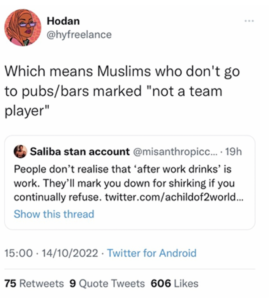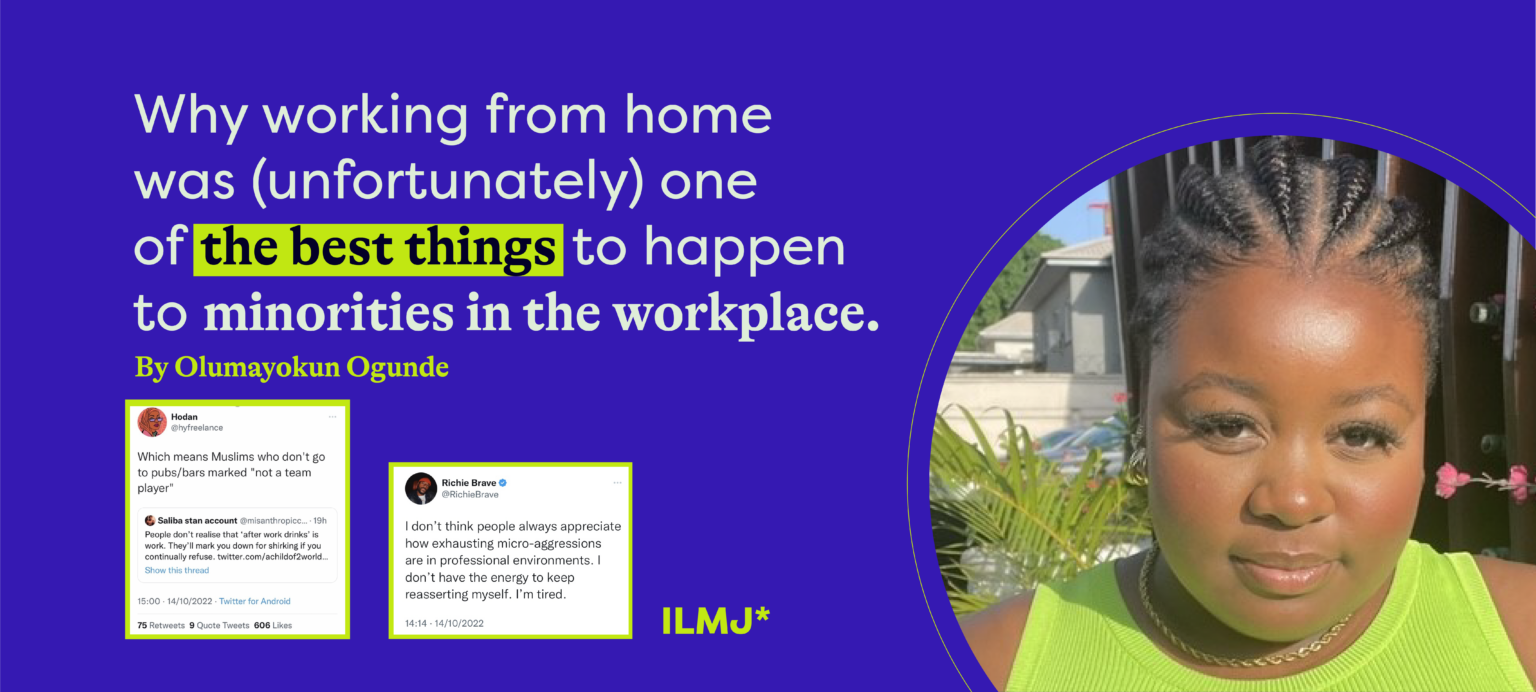*Or as we prefer to call it: ✨ the global majority ✨. Meet Olumayokun Ogunde, a Creative Writing MA graduate, currently working as a freelance copywriter. She’s dedicated to telling the stories of black women and other marginalised identities. As well as combining her education in writing craft with her desire to champion underrepresented voices by highlighting their experiences in the workplace.
Olumayokun is working on her debut manuscript, and you will often find her pouring over the keys of her laptop, creating new worlds.
Thank you for sharing your story with us Olumayokun…
I don’t think people always appreciate how exhausting micro-aggressions are in professional environments. I don’t have the energy to keep reasserting myself. I’m tired.
— Richie Brave (@RichieBrave) October 14, 2022
And he’s right.
For most people working from home is the perfect opportunity to better their work-life balance. This set up serves as an opportunity for people to spend more time with their kids, to go the gym at lunch, or stay home for a supermarket delivery. But for many minorities, working from home offered some relief from the challenges of the office, transforming their work lives.
working from home is incredible
just the ability to sit down on the couch for five mins after a stressful meeting and not talk to anyone… or to watch your show during your lunch break and not talk to anyone… or to take a mid-day walk and… not talk to anyone…
— les (@lesUCF) October 28, 2022
A survey conducted by the Future Forum Pulse in comparing responses in 2020 and 2021, saw a 26% rise in black respondents reporting that they felt they were ‘treated fairly at work’. This uptake can be said to reflect on the positive impact of the shift towards remote working on black respondents.
@insidevoices.io Good luck getting us back! #blackatwork #antiracismdaily #diversitymatters #insidevoices #blackfuturesmatter #remotework #microaggressions #codeswitching ♬ Michigeese Michigander-JP – Thirst Follow

Working from home has transformed the dynamics of many workspaces. Now, leaders, clients and colleagues may have never even have met. This has protected many from barriers of cultural bias by removing them from the physical environment of the office. No one can truly tell if you’re Tall or Fat or Black, especially in the age of ‘cameras off culture’. People of colour can make their lunches without hearing What’s that smell? Considering the much-needed increase in awareness around accommodations for neurodivergent people in the workplace, adults with autism have expressed appreciation for the particular freedoms that working from home has been able to provide them.
@ashleighfare people ask me if I feel I’m missing out on going to the office… not really no 😂 #fyp #foryoupage #autism #adhd #neurodivergent #workfromhome #autismacceptancemonth ♬ original sound – ashleigh
Minorities in the workplace are often burdened with the issues of Micro-aggressions, expectations to code-switch, and other implicit biases. Muslim workers don’t feel the alienation from ‘after-work drinks’, black women are not subject to underhanded comments about their hair, trans people don’t face as much scrutiny regarding their presentation.
Despite all this, despite the safety and comfort of working from home has offered many marginalised communities in the workplace, there is still a desperate need for change. Workplace culture needs to change. Whether from behind a screen or face to face. Employees need to know that there is a place for them at work that is not full anxieties and essentially tainting their relationships with work.
Managers and colleagues can do their part to make both working from home, and office-based work more inclusive for their minority colleagues.
After speaking to people-first company culture specialist HappyHQ, here are some tips to improve working environments:
👉🏾 Companies can invest time in educating on implicit biases; how to manage and change them beyond surface level. Sourcing experts and people with lived experiences to share strategies on how to move away from long held standards of professionalism in areas such as clothing, hair, and speech. Making impact-minded actionable changes to workplace practices.
👉🏾 Create a culture where workplace boundaries are appreciated and respected. Colleagues should consider whether certain remarks and attitudes are putting others in an uncomfortable and vulnerable positions.
👉🏾 Allow people to practice authenticity by re-accessing ’professionalism’, so people can show-up as themselves. Every company can come up with its own standard of professionalism based on the environment and inclusivity. For example, re-thinking dress-codes.
👉🏾 For diverse teams, honour celebrations across all cultures. Provide time off and embrace work socials for cultural customs, traditions, and holidays so everyone can get involved.
👉🏾 Introduce an attitude of flexibility where possible. Hybrid working formats are becoming more popular across the working world. Allow employees to have the agency to decide which work environments are most conducive to their productivity.
👉🏾 Ensure offices serve the working community. Inclusive spaces with features such as prayer rooms, sensory decompression spaces, and quiet rooms.
👉🏾 Listen to minority colleagues. This is the most authentic way to invite change. Companies should have open and impartial forums for minority colleagues to voice their concern, safe spaces to be heard and supported.
Covid changed the world landscape, altering our way of functioning in ways we couldn’t have imagined. But it’s not an excuse to ignore or avoid issues that have affected people in our working communities. This isn’t the time to bury our heads in the sand. We need to meet each other at eye level and make the changes we need to ensure as many people as possible can answer the question “Do you feel valued at work?” with an exuberant yes.



